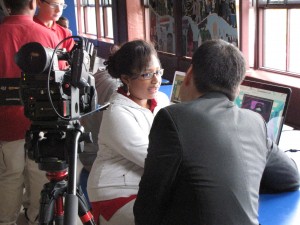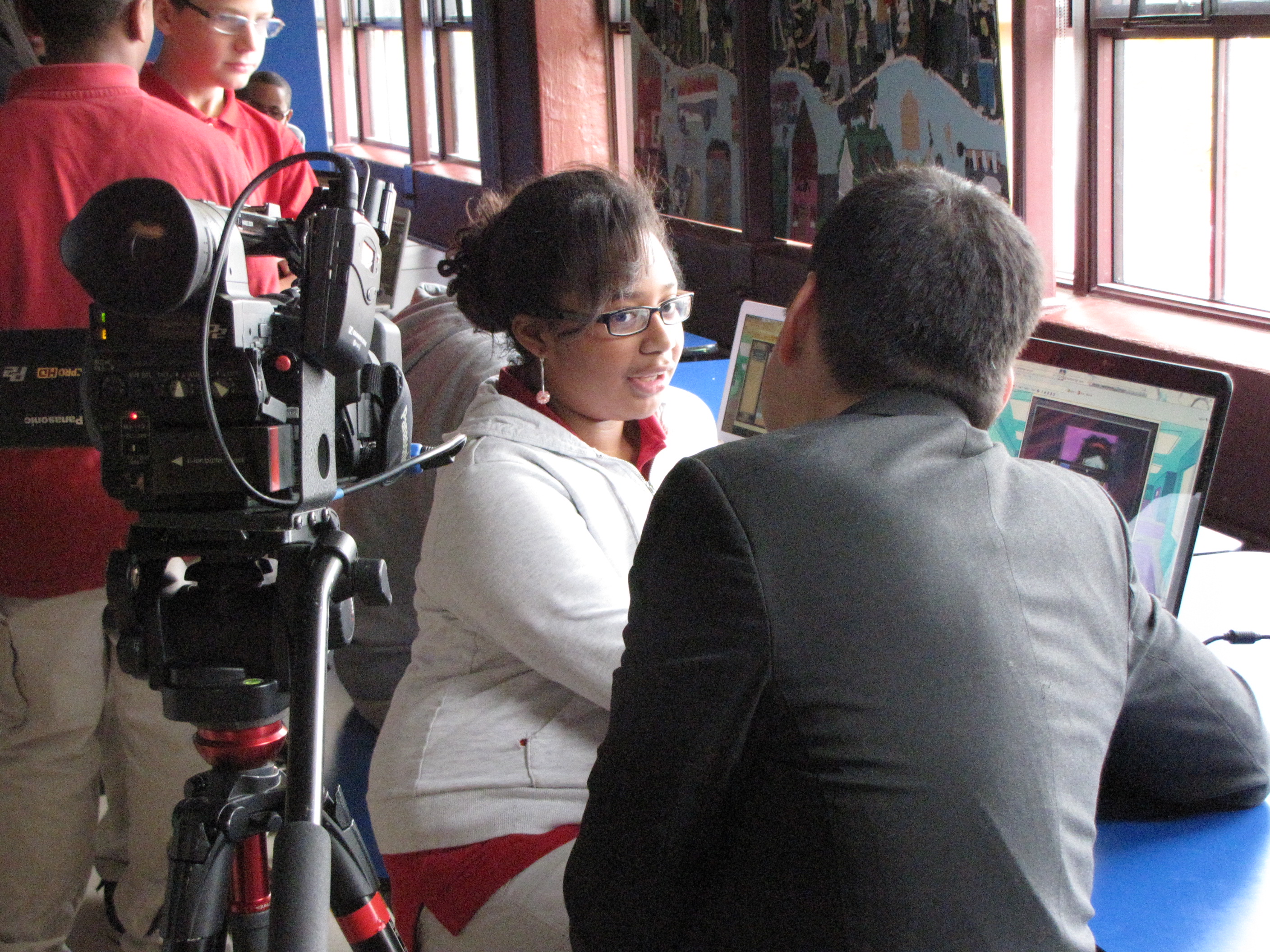 The catechism of the Catholic Church is quite clear on the matter of communicating with the dead. On the official Vatican website under the heading “Divination and Magic” is the clear Church teaching on the matter (emphasis mine):
The catechism of the Catholic Church is quite clear on the matter of communicating with the dead. On the official Vatican website under the heading “Divination and Magic” is the clear Church teaching on the matter (emphasis mine):
2116 All forms of divination are to be rejected: recourse to Satan or demons, conjuring up the dead or other practices falsely supposed to “unveil” the future. Consulting horoscopes, astrology, palm reading, interpretation of omens and lots, the phenomena of clairvoyance, and recourse to mediums all conceal a desire for power over time, history, and, in the last analysis, other human beings, as well as a wish to conciliate hidden powers. They contradict the honor, respect, and loving fear that we owe to God alone.
Essentially, no Catholic in good standing should avail themselves of a medium, or promote the belief in a medium’s powers.
This is what so surprised me about the November 15th episode of the John DePetro Show featuring psychic medium John Edward. Call me naive but despite whatever differences exist between me and DePetro regarding religion and politics I always thought the radio personality was at least being honest when he maintained to me, his listeners and to frequent guest Bishop Tobin of the Providence Diocese that he was a devout Roman Catholic.
It is, after all, DePetro’s Catholicism that informs his attitudes on things like the State House holiday tree, the Cranston West prayer banner and the Woonsocket cross, among other issues. When I was on the DePetro Show to talk about the death threats made against my niece Jessica Ahlquist in the wake of the judge’s decision on the Cranston West prayer banner, DePetro asked me if Jessica was a witch, or a devil worshiper. These were ridiculous questions, and of course I answered that she wasn’t, but when self-proclaimed psychic John Edward was on his show, professing the ability to talk to the dead, DePetro practically bent over backwards to kiss ass, even though the Catholic Church categorizes psychic mediums alongside witches and devil worshipers as a matter of course.
DePetro says that Edward is “one my favorite guests that we have on the program” and wishes him “much continued success.” DePetro eagerly helped Edward sell his books, his website, and his personal appearances and shows. DePetro seemed genuinely entranced by the success of Edward’s website, which sells the concept of communicating with the dead. DePetro also gushed over the fact that Edward has a book on the New York Times bestseller list, and he joined with the callers to the show at being amazed at Edward’s supposed psychic abilities.
John Edward claims to be psychic, but as has been pointed out everywhere from Wikipedia to South Park, nothing he does hints at any sort of real supernatural power. Instead, it all seems to be based on a technique called cold reading “a series of techniques used by mentalists, psychics, fortune-tellers, and illusionists to determine or express details about another person, often in order to convince them that the reader knows much more about a subject than they actually do.” On South Park Edward is awarded the title of the biggest douche in the universe, and the episode contains the following bit of dialog between Stan and John Edward.
John Edwards:
But I’m a psychic.
Stan:
No dude, you’re a douche.
John Edwards:
I’m not a douche. What if I really believe dead people talk to me?
Stan:
Then you’re a stupid douche.
On the John DePetro Show in question Edward performed no better and actually quite a bit worse than a stage magician might have using techniques that are not the least bit supernatural in nature. In the following transcript, Edward communicates with Christine:
Edward: Hi Christine.
Christine: Hi how are ya?
Edward: Good. Are you Christine Marie?
Here Edward makes his first psychic guess, and he’s flat out wrong.
Christine: No.
Edward: Who’s the “M” name connected to you Christine?
Christine: Um…I don’t know. (nervous laughter)
Edward: Is it somebody living connected to you with an “M”?
Christine: I’m trying to think… No nothing that I know of…
Getting nowhere, Edward abandons that line of inquiry for a moment.
Edward: Okay. Keep going. What was your question?
Christine: Uh, I was just- my father passed away and I just wanted to know if he was happy and if he was with his dog and my grandmother who passed away who I lived with a long time ago. I always felt that I didn’t do enough for her when I was with her and I’ve always had regrets about that.
Edward: Um, I have to tell you I’m seeing a huge “M” connected to you.
Christine: M? Well, my last name begins with M.
Edward: Oh. So you’re Christine M.
Christine: Yes.
Circling back, Edward suddenly gets a hit. But think back a few seconds ago. Edward asked about an “M” name connected to Christine, who of course was thinking about someone other than herself. When Christine reveals that her last name begins with M, Edward can retroactively claim that this is what he was going for all the time. I should also point out here that Christine is dealing with quite a bit of guilt about the way she treated her grandmother and worry about the fate of her grandfather. Edward seems less interested in comforting Christine than he does in scoring a “hit.”
Edward: Okay. Because they’re telling me to put an M next to you and I’m like I thought that your middle name was with the M. Um, I do believe that your dad is totally with family and our fur pawed friends are definitely family specifically in my frame of reference. And somebody has a heart problem and they passed one, two, three, correct?
This is Edward talking fast, retrofitting information to his guesses, pausing briefly to provide false comfort to a bereaved woman with tales of her father living in the afterlife with a favorite pet, and then jumping to heart disease, the most common way for older males to die.
Christine: Uh, well yeah. Well, my dad kind of passed kind of like unexpectedly but you know through bad circumstances.
Christine does not confirm that her father died of heart disease. Just that he died “through bad circumstances” which sounds like it might be due to accident or crime rather than disease. Either way, Edward does not press the point. He moves off the “dad had a heart attack” idea and onto another deceased relative, or someone close to Christine and her father, who might have died that way.
Edward: Well, here’s what I’m seeing and you know I have a limited amount of time. I know that there’s somebody that’s with your dad, or with you, that passed from a sudden heart attack there was no pre-existing kind of clue that this was happening
Christine: Mm-hm
Edward: And they’re coming through with your dad and around you. All righty?
Christine: Okay.
And that’s it. Hell of a psychic reading, isn’t it? Christine provided no confirmation about anything Edward said. What did Christine learn from this encounter? That her dad was in heaven with his favorite pet and that he knew someone up there who died of heart disease, the most common way for men to die. Since she offered up the idea that her father might be in heaven with his pet, all Edward did was agree with her. She learned exactly nothing, unless you count the fact that her last name began with the letter “M.”
Here’s the last caller of the morning, Kevin. Every guess Edward made in this encounter was wrong or went nowhere. It is hard to imagine a less impressive display of psychic ability:
Edward: I heard, I saw, in my head, somebody who drove a truck for a living. So, I don’t know if somebody actually worked in the trucking industry or transportation, but I was supposed to talk about someone’s truck or somebody driving in their truck for a living. Did somebody do that?
Kevin: My father was a fireman.
Edward: So he drove the firetruck?
Kevin: He was involved with the truck. Absolutely.
Edward: Is there something that you were doing this week, a lot of times they’ll talk about current affairs or current events around but is there something that you were doing that’s like talking about that talking about his involvement with that talking about, maybe looking at the photos or things of that nature?
Kevin: Uh, not really. I think about him all the time.
Edward: And why am I seeing 1986, 1987, what took place around then in the family?
Kevin: Um…
Edward: It’s got to be after 1985 and before 1989, I’ll tell you why, I started owing this work in 1985 and my mom passed in 1989 and I feel like it’s in between that period of time that I’m supposed to highlight something. But I feel that your dad would be the one. Is he the one connected to the truck, your dad is the one that I was sensing but there’s something about that time period that I want to highlight for you.
Kevin: uh… My brother passed away in 1996…
Edward: Nope. Too late it’s got to be before that. It’s got to be after 1985
Kevin: I moved from New York to Rhode Island in ’84, but that’s before ’85.
Edward: Nope. I think it’s right after that.
Kevin: Nope.
Edward: If that’s your benchmark, if that’s your move from New York to Rhode Island, think right after that. Like within a couple of years maybe somebody was born, maybe somebody got married but something had to take place within that period of time.
Kevin: uh…
Edwards: I’m sure your family’s around you.
Kevin: Okay.
Edward got zero out of zero on that one.
It should be pointed out that Edward does not consider himself to be just a performer. He writes books that are supposedly non-fiction that purport to explain psychic powers and abilities to people. He maintains that he has real and true psychic abilities. Edward is not doing a magic show with “tricks” and with an audience prepared to be knowingly deceived, he actually claims to communicate with the dead.
Edward performs to sold old audiences and maintains a for pay website, JohnEdward.net. As DePetro says in his opening:
Go to his website. I don’t know where he gets any time off. John Edward.net. Communicate Appreciate, Validate. Then you look at some of the events. He’s going to be in Boston November 29th. Sold out. November 30th in Boston. Sold out. December 1st, New Brunswick New Jersey. Sold out.
DePetro doesn’t mention that tickets to the Edward events are $150 each. Edward has books on and off the New York Times bestsellers lists. He charges $800 for private consultations. he has a TV show. He makes a lot of money, maybe millions, claiming to connect gullible and bereaved people with their deceased loved ones.
It’s not like Edwards hasn’t been called on this. The Center for Inquiry reports on a Dateline: NBC episode where Edwards claimed to have gleaned psychically information he was known to have gotten through ordinary means. Reporter John Hockenberry interviewed Edward:
Hockenberry: So were you aware that his dad had died before you did his reading?
Edward: I think he-I think earlier in the-in the day, he had said something.
Hockenberry: It makes me feel like, you know, that that’s fairly significant. I mean, you knew that he had a dead relative and you knew it was the dad.
Edward: OK.
Hockenberry: So that’s not some energy coming through, that’s something you knew going in. You knew his name was Tony and you knew that his dad had died and you knew that he was in the room, right? That gets you…
Edward: That’s a whole lot of thinking you got me doing, then. Like I said, I react to what’s coming through, what I see, hear and feel. I interpret what I’m seeing hearing and feeling, and I define it. He raised his hand, it made sense for him. Great.
Hockenberry: But a cynic would look at that and go, ‘Hey,’ you know, ‘He knows it’s the cameraman, he knows it’s Dateline. You know, wouldn’t that be impressive if he can get the cameraman to cry?’
Edward: Absolutely not. Absolutely not. Not at all.
Reasonable people know that John Edward cannot actually talk to the dead. It is barely possible that Edward believes he does in fact possess such an ability, but far more likely that he knows that he cannot and that he is faking it. It is also barely possible that Edward rationalizes the massive amount of money he takes from gullible and desperate believers by believing that he provides some sort of comfort, however false, as well as entertainment. But it is also possible that Edward is knowingly taking money from people under false pretenses, and laughing all the way to the bank, building a fortune on the backs of people who have lost those they loved most.
As South Park put it, John Edwards is either a douche, or a stupid douche.
The same goes for John DePetro. As I pointed out, DePetro can hardly maintain the facade of being a good Catholic while at the same time extolling the virtues of Edward’s supposed psychic powers. Mediumship is anti-Catholic at best, and at worst it is considered Satanic.
DePetro does not stand to make millions by promoting Edward so fiercely, at best he’ll score a small ratings bump. Perhaps DePetro simply believes that Edward is a performer, providing comfort, false as it is, alongside a good dollop of entertainment. But DePetro knows that all or nearly all of Edward’s fans and followers really believe in his professed abilities, and presenting something false as truth is, to borrow from South Park, douchey.
If John Edward is, after all, the biggest douche in the universe, perhaps those like John DePetro who help sell and promote his deceptions, are angling to come in second.













